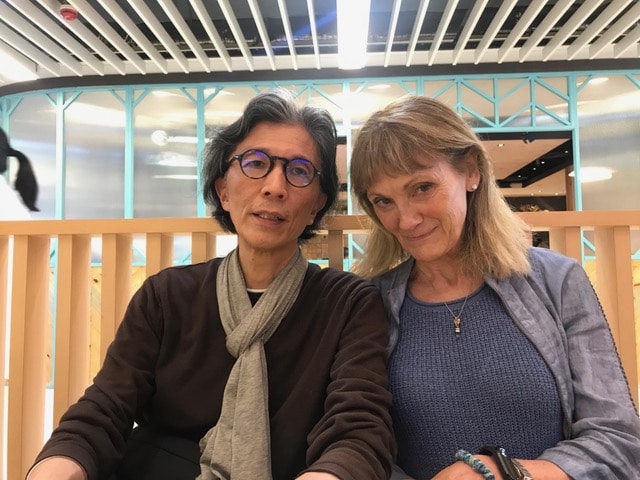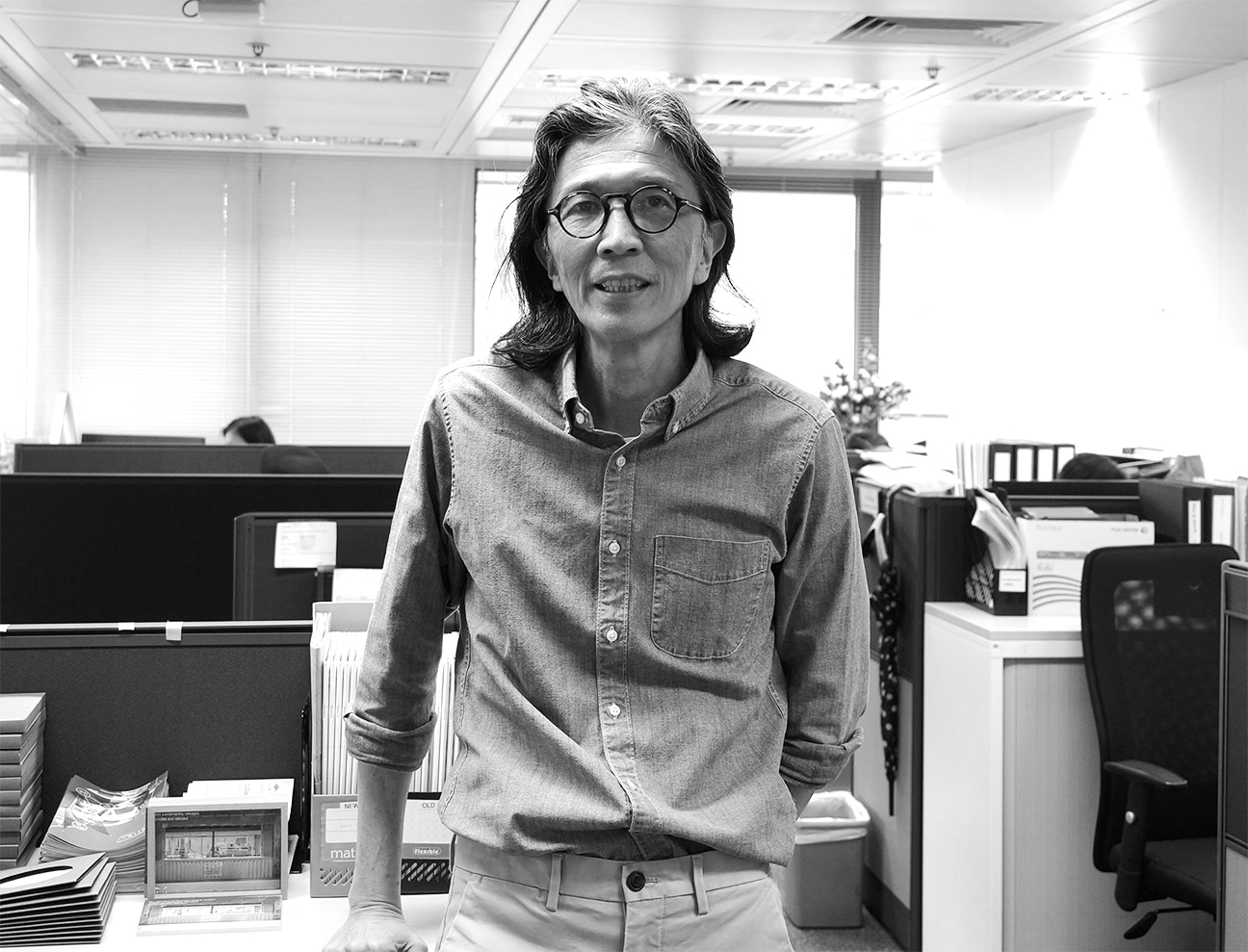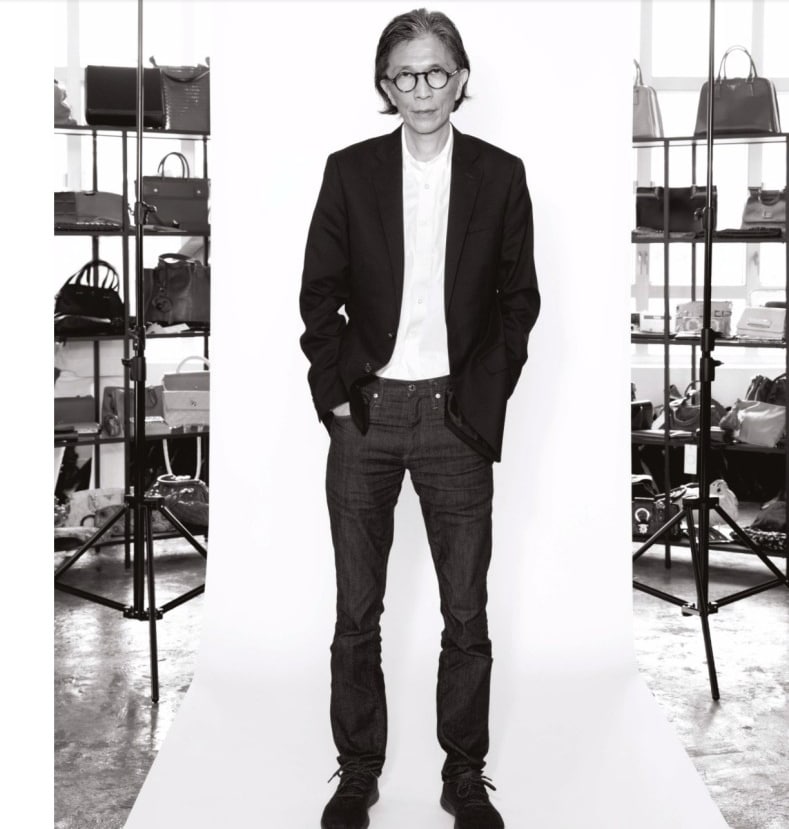The extraordinary story of a beginning of very little promise that led to an ongoing career of impact and innovation. As a near-failing high school student, Edwin overcame dyslexia, learned how to learn, studied with the great Peter Drucker, worked in refugee camps for the UN, following his curiosity around logistics and went on to lead the massive multi-billion dollar Walmart supply chain, helping to move them to more sustainable solutions in their operations. Not satisfied and ever striving to push his potential, he left Walmart and led the effort to create the incredibly innovative Billie System, a sustainable water-free method of recycling fibers into new usable yarns. The Billie is not only a technical success but a financial one, being located in the most expensive city in the world, thus proving that circular solutions are possible for the incredibly wasteful garment industry.(Read here Ronna Chao on her work on the Billie System in Hong Kong.)
Focus on the Here and Now
Part of our discussion was around life extension, a concept he finds difficult: “Why go for more life when it may be better to focus on what you can do here and now?” This captures his approach to life, the idea of making the most of what we have now, and that we each have the capacity to make an impact for the good of others.
When I called Edwin on a Saturday morning in Hong Kong, I was intending a short 15-minute chat about his life. What I got was an energizing and challenging conversation with the most unique human being. If there is one characterization of Edwin, it would be “fully switched on” as our conversation looped and dived across global culture. It was one of those conversations that inspires and redirects one’s thinking.
Within the profile today will be excerpts from a commencement address that Edwin will be giving in Hong Kong at The Maryknoll Convent School this weekend.
“My first suggestion to you is be curious, ask questions. Curiosity saved me and motivates me to learn … curiosity is more important than talent, intelligence, or aptitude. In our fast-moving age, being curious, seeing the big picture, and continuously learning is how we can keep up with and make sense of our world. So be curious. Be a lifelong learner. Make it also your aim to find and be in the company of other curious people.”
What do you mean by intelligence is contagious, that we are more porous than we think we are?
I think all of us are “work in progress” — we are influenced by who we allow into our lives. So by observing, interacting, and spending time with smart people, we can learn to adapt some of the learning patterns, the reasoning methods, and the thought processes. I suspect we all have resources that we have not tapped into that others can help us with. We are who we hang out with sometimes.
“I think curiosity gets us into the right situation for things to happen to us”
What do you see as the relationship between serendipity and curiosity?
I think curiosity gets us into the right situation for things to happen to us. By asking the right questions we get motivated to discover and learn. There is a cost to this; in my experience, knowing and seeing can sometimes be bittersweet. With truth comes responsibility.
On dyslexia: “I had to learn to see the big picture, put everything in context and make the connections. I learned to express myself in writing, and most important I developed a sense of curiosity about how things work, why things are the way they are, how everything is connected, and why people are the way they are. I became interested in learning. I had to learn how to learn. As result, unnoticed by me, my grades improve and I enjoyed being in the classroom again.
I can’t read letters well, but I am good with shapes and colours so I learned to associate words and concepts with different colours and shapes. I can’t understand the details, but by seeing the big picture, the forest, I can then understand the details, the trees. “
What is it like to have to spend $1B a day in buying products for Walmart? How does one even do that?
It is complicated… and it demands focus, dedication, and a lot of your energy. I found it became easier when I was able to build a great team.
Walmart’s Sustainability Challenge
How did you convince Walmart to move towards sustainability?
I didn’t. Lee Scott, the then CEO of Walmart articulated the vision for this in a speech in 2005 (“21st Century Leadership” is the title), however, he did not get any traction in the company. They had an aspiration without a strategy. They also discovered that over 80% of the sustainability challenge is in the global supply chain so they were looking for people to help them to lead the change there. I was approached by the guy who was going to be the next CEO, Mike Duke. We then spent the next 2 years working out the strategy in a way that makes sense for Walmart. This is a short version of a much longer story…
Why did you leave what could have been a very financially rewarding job?
I never intended to stay long. I thought I could be more useful as less of a doer and more of a writer and thinker. We all know at some level the difference between doing something because we can do the job well and what job we should be doing. It’s great if the two are the same. We all only have so much time and resources to spend, we should use these well.
“Be ambitious to do great things. Be ambitious for the right things. Take risks. Aim high in life and in your goals. Dream big dreams; small dreams won’t motivate or drive you. Solve big problems; do great things. It is too small a goal for you to aspire just to be happy, rich, or famous. It is not enough. Aim to solve big problems with your life. Find a cure for cancer, solve world hunger, stop climate change. Deal with the biggest issues of your generation.”
What is a challenge that you found very difficult, and have overcome?
Balance is a big one for me. We all have multiple roles in life. I don’t want to mess up on being a good husband and a good father.
“My belief has always been to do what is useful, what is right, and get good at it.”
What do you say to people who are unsure of their path forward?
Find out what is important to you, what you care about, what purpose drives you. Then observe and learn what the greatest needs of the world are. Figure out where X meets Y, and move in that direction. The trick is to move in the right general direction; eventually, everything will come into focus.
Have you ever had a plan for what you wanted as a career trajectory?
I think the traditional construct of what a career looks like is being disrupted. Technology is changing the roles we play in society. I was lucky not to ever worry about what a career should look like. My belief has always been to do what is useful, what is right, and get good at it. Make a useful contribution.
The end for me has always been to be useful and make a contribution. The by-product of this is the stuff that happens along the way (career, paychecks, promotions…). We will not be useful, successful, or fulfilled if we mix up the by-products with the end-products… hope this makes sense to you.
Working for the United Nations High Commission for Refugees
What was it like working for the UNHCR? What did you learn there?
I worked for the UNHCR (United Nations High Commission for Refugees) for 2 years, my first job after I got my Bachelor’s degree. I was in a series of refugee camps that looked after Vietnamese boat refugees. I worked mostly as a news editor. I provided new stories for the resettlement countries. Eventually, I was also a resettlement lobbyist. I focused on work with the State Dept for resettlement quotas for the US.
This is still to this day the most frustrating job experience of my life. I watched people die unnecessarily and I was powerless to help. There were several big learnings from this; one of them is that a lot of resources does not guarantee effectiveness. Large complex organizations need good leadership, management, and clear mandates to be productive and useful.
“On your death bed, you don’t want to have regrets or fears. It’s too late to say sorry, it’s too late to wish you could do that thing that you always wanted to do, it’s too late for everything. Live with a sense of passion and urgency. Be useful, productive, and good. Use your life well.”

Life in Three Phases
What are the three phases of life that you have been living by? What phase are you in now?
I sort of mapped out my life in 3 general phases. The learning phase, the doing phase, and the thinking/teaching phase. These are not hard and fast phases where we have clear transitions; I think we sort of naturally progress from one to the other. For example, we start out in more formal learning settings; we eventually move to more informal on-the-job learning. Earlier on our work may be more operational in nature; eventually we move to more strategic and organizational roles. These stages could be characterized as the dominant features of what value we are creating… the reason for looking at life in stages is to make sure we make the transitions.
The thinking/teaching phase is that period when we are most useful by sharing and thinking about all the things we have learned and what principles and insights we have got and how can we systematically share these with others. We have messed up enough times so we should tell people what not to do. Very definitely I am trying to think and talk about things more these days. I’m still trying to ask great questions but nowadays I try to influence more. Eventually, I will have to learn to write better and more effectively communicate.
Do you find that you grow from uncomfortable situations, from beauty, both, or maybe something else?
Yes, growing is uncomfortable. There are some smart people who have figured out how to do this more elegantly. Always there seems to be a price to pay.
“If the work can go on, if the work leaves a mark, if it made a difference, then it’s a life well-lived.”
What is your idea of a life lived well?
A life lived productively, doing useful work, making the most of the resources we are given. In my mind, the goal is to make an impact, an improvement, and leave some contributions. If the work can go on, if the work leaves a mark, if it made a difference, then it’s a life well-lived.
What did you learn from Peter Drucker?
He is an inspiration for me as a lifelong teacher and a lifelong learner. He became kinder and more thoughtful in his later works. Peter could see the whole system and make sense of the parts. Some of his work made more sense to me years later after I have a chance to look back.
You mentioned that life extension doesn’t make since to you. How so?
We should live with passion and urgency. We should make every moment count. It’s the quality not the quantity that matters. If we know we only have a limited, short amount of time and everything can change anytime, it would help us be more present. So to artificially live longer seems futile and a waste of energy… instead, let’s focus on living fuller, richer lives.
Billie System and a Circular Economy
What is so revolutionary about the Billie System in terms of a business experiment and how it can affect sustainability and the circular economy?
It’s a first-world solution to post-consumer apparel recycling. It’s a dry system to make high value output. The goal is to make this profitable and useful in one of the most expensive cities in the world… Billie demonstrates the possibilities.

Family Life
I understand your wife is Caucasian, from Iowa. How did you meet? What do her parents think of you?
My wife Claudia is from Waterloo, Iowa. She is a linguist. We met in the refugee camps. She was an English teacher. Her parents were not happy that we were dating. When we announced that we were getting married, in 1981, in Hong Kong, they were concerned. In 1981 dating a Chinese was controversial (unheard of) in her conservative town. I made it my life mission to win the parents and her family over… I am currently the favorite son-in-law! Hence the American accent. We’ve been married for almost 40 years now. I got lucky. Two things about my wife: since she got her PhD, she has decreed to the family that she will only answer to Dr. Keh; when she is not happy with our sons, she introduces them as Edwin’s sons from his first marriage.
If you were not teaching and running a research facility, what would you be doing?
I think I would like to learn to write better and more. I am not a good writer. I would like to spend more time thinking and organizing my thoughts better. I am the happiest hanging around young people so hopefully, I still get to do that.
The ideas expressed here are solely the opinions of the author and are not researched or verified by AGEIST LLC, or anyone associated with AGEIST LLC. This material should not be construed as medical advice or recommendation, it is for informational use only. We encourage all readers to discuss with your qualified practitioners the relevance of the application of any of these ideas to your life. The recommendations contained herein are not intended to diagnose, treat, cure or prevent any disease. You should always consult your physician or other qualified health provider before starting any new treatment or stopping any treatment that has been prescribed for you by your physician or other qualified health provider. Please call your doctor or 911 immediately if you think you may have a medical or psychiatric emergency.
AUTHOR

We will never sell or give your email to others. Get special info on Diet, Exercise, Sleep and Longevity.


